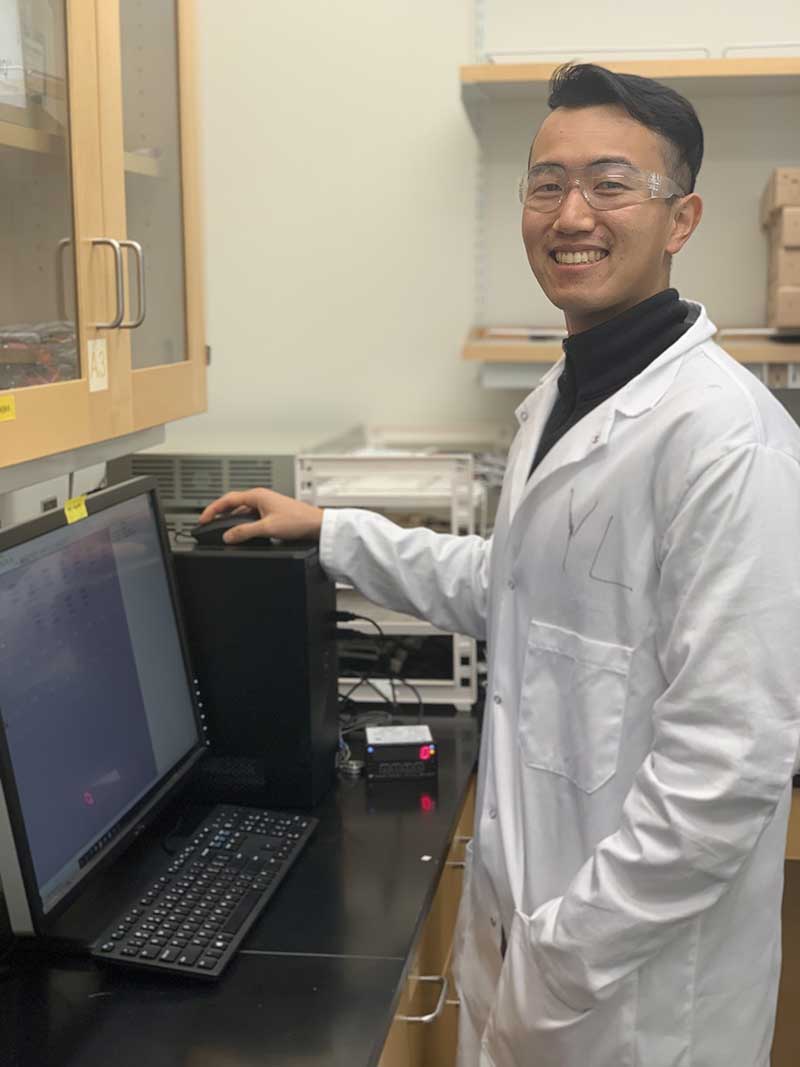IC Postdoc participant conducted research improving batteries
Meet Yuzhang Li
American physicist Richard Feynman once said, “We are at the very beginning of time for the human race. It is not unreasonable that we grapple with problems. But there are tens of thousands of years in the future. Our responsibility is to do what we can, learn what we can, improve the solutions and pass them on.”

Yuzhang Li, Ph.D., conducted research on batteries and battery materials in order to improve the performance and efficiency of lithium-ion batteries. Photo Credit: Yuzhang Li
Yuzhang Li, Ph.D., lived up to the responsibility Feynman spoke of by tackling energy storage problems as part of the Intelligence Community (IC) Postdoctoral Research Fellowship Program.
The IC Postdoc Program is administered by the Oak Ridge Institute for Science and Education (ORISE). The program offers scientists and engineers from a wide variety of disciplines unique opportunities to conduct research relevant to the Intelligence Community. Under the guidance of his mentor, Professor Yi Cui at Stanford University, Li conducted research focused on improving the performance and efficiency of batteries.
“Broadly, my research seeks to build better batteries that are cheaper, longer-lasting, faster at charging, and safer,” explained Li. “This requires research efforts in both engineering design as well as developing tools to understand how and why batteries fail.”
Throughout his fellowship, Li focused on several areas of battery research. His primary project focused on designing and fabricating a graphene coating, attractive for its unique mechanical and chemical properties, on silicon (Si), an anode material that stores ten times more lithium-ions than traditional carbon-based anodes. Lithium-ion batteries are commonly used in portable electronics and electric vehicles, with increasing penetration into grid-scale storage needed to enable renewables like wind and solar. However, the 400% volume expansion of Si during battery charging introduces multiple challenges including mechanical breaking and instability of interface. As a result, it has long been believed that micrometer-sized Si would not work as battery anodes.
However, Li innovated a novel concept breaking this conventional wisdom by designing and synthesizing a mechanically robust graphene cage to encapsulate micrometer-sized Si. Although Si would break, it would be kept electrically connected within a graphene cage and protected against electrolyte corrosion. Li’s research efforts demonstrated incredible battery charge/discharge cycling performance and elucidated the fundamental science behind it. His accomplishments provide an exciting milestone in the field of battery research.
The results of Li’s research will contribute to the continued electrification of the transportation sector, which will help reduce the use of fossil fuel-based vehicles. Fossil fuel-based vehicles, such as gasoline-powered cars, emit greenhouse gases that have been shown to exacerbate climate change. According to EPA, the transportation sector accounted for 28.2 percent of the total U.S. greenhouse gas emissions in 2018, equivalent to approximately 1,870 million metric tons of carbon dioxide. By improving battery performance and efficiency, Li is subsequently helping improve the functionality and range of battery electric vehicles, which will help decrease greenhouse gas emissions.
“I had a very positive experience and am thankful to the support of not only my research advisor, but also my mentor from the Intelligence Community. I would strongly recommend the IC Postdoc Program to others.”
Furthermore, Li’s research also contributes to energy storage efforts at the grid-scale level, which could facilitate the addition of more intermittent sources of renewable energy, such as wind and solar, to our energy portfolio. Increasing the use of renewable energy sources is another key part of reducing greenhouse gas emissions and reducing the impact of climate change for future generations.
A typical day for Li is comprised of conducting experiments in the laboratory, collaborating with colleagues and providing research updates. As a result of his appointment, he gained valuable experience in areas such as cryogenic electron microscopy, as well as disciplines outside of his usual comfort zone.
“This experience has encouraged me to read broadly beyond just my own field of research,” said Li. “New breakthroughs can be facilitated by learning from other disciplines.”
Li speaks highly of each of the various aspects of his appointment, but is particularly grateful for the opportunities he had to interact with and learn from other research fellows, as well as the freedom he had to pursue his academic interests.
“I had a very positive experience and am thankful to the support of not only my research advisor, but also my mentor from the Intelligence Community,” Li said. “I would strongly recommend the IC Postdoc Program to others.”
Li currently serves as an assistant professor at UCLA and hopes to continue making contributions to further the fundamental understanding and engineering design of next-generation battery materials. He also aspires to be a positive mentor for young students interested in clean energy and STEM.
The IC Postdoctoral Research Fellowship Program is administered by the Oak Ridge Institute for Science and Education (ORISE) under an agreement between the Office of the Director of National Intelligence (ODNI) and the U.S. Department of Energy (DOE). ORISE is managed for DOE by ORAU. For more information about the IC Postdoctoral Research Fellowship Program, please visit https://orise.orau.gov/icpostdoc/.

